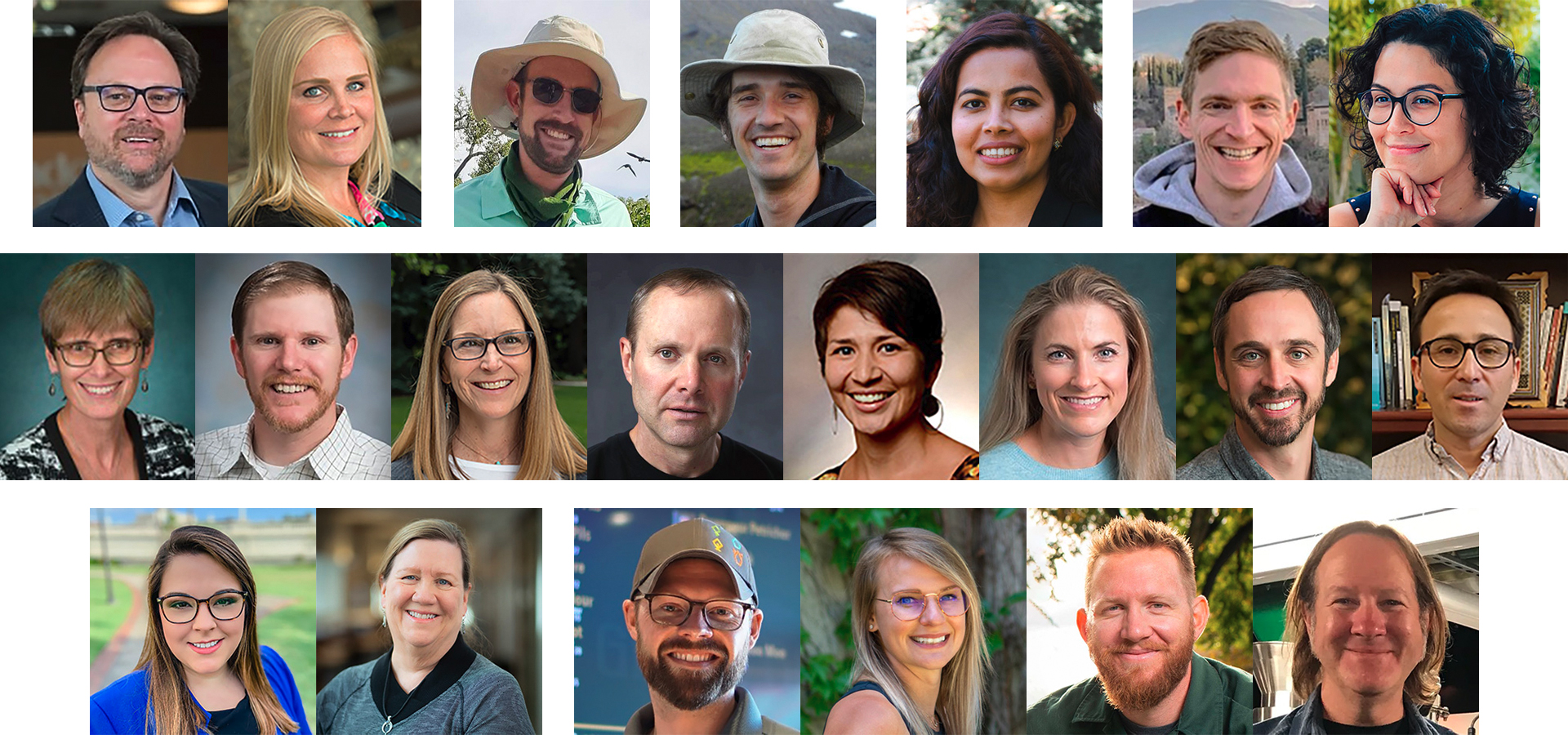
The CSU School of Global Environmental Sustainability (SoGES) is pleased to announce eight new proposals have been awarded 2023 Sustainability Curriculum Innovation Grants. This was a highly competitive year as there were many creative and inspiring proposals submitted.
The annual Sustainability Curriculum Innovation Grants, created in partnership with the President’s Sustainability Commission, aim to increase student exposure to interdisciplinary sustainability concepts across all fields of study at CSU. The grants help enrich curriculums by allowing faculty to creatively integrate social-economic-environmental sustainability concepts into new or existing courses. They also allow faculty to empower students in their future careers by increasing their knowledge of interconnected global problems.
Grant recipients are chosen based on written proposals that demonstrate how they would develop course curriculum that better amplifies or ties together aspects of their interdisciplinary studies with social-environmental-economic sustainability concepts. The School of Global Environmental Sustainability seeks proposals that are creative and inventive, so criteria for proposals is intentionally broad and faculty from all disciplines are encouraged to apply.
The projects that received SoGES Sustainability Curriculum Innovation Grant funding this year are:
- ESG Investments: Harry Turtle, professor, Department of Finance and Real Estate; Hilla Skiba, associate professor, Department of Finance and Real Estate – Proposes to develop a signature experience ESG (Environmental, Social, Governance) student-managed investment fund that will be implemented across multiple finance and business classes.
- Feeding the World in a Challenging Climate: Justin Reeves, senior instructor, Department of Agricultural Biology – Proposes the development of a new AUCC course that will explicitly cover climate change and global food security, intertwining the social and economic issues of food with climate science, fulfilling the Biological and Physical Sciences AUCC category.
- Infusing Environmental Geochemistry with Real-World Sustainability Examples: Jeremy Rugenstein, assistant professor, Department of Geosciences – Proposes to rewrite the curriculum of GEOL366 Sedimentary Petrography and Geochemistry to apply the foundational concepts and quantitative skills students learn to real-world issues, helping students better understand how their geochemistry knowledge can be applied to issues concerning sustainability, society and global change.
- Learning Forest Contributions in Mitigating Climate Change: Srijana Baral, assistant professor, Department of Forest and Rangeland Stewardship – Proposes to integrate economic concepts about forest carbon and carbon offset markets into an existing chapter of an undergraduate forestry course, F322. It will include an introduction to forest carbon quantification and valuation, combined with a hands-on experience in CSU’s Sherwood Forest.
- Lessons in Sustainable Agriculture from Native American Communities: Jessica Davis, professor, Agricultural Experiment Station; Matt Camper, master instructor and assistant dean, Department of Agricultural Biology; Addy Elliott, instructor and assistant dean, Department of Soil & Crop Sciences; Gregory Graff, professor, Department of Agricultural & Resource Economics; Shannon Mason, instructor, Department of Horticulture & Landscape Architecture; Suellen Melzer, assistant professor, Department of Soil & Crop Sciences and SoGES; Joshua Sbicca associate professor, Department of Sociology; Jorge Vivanco, professor, Department of Horticulture & Landscape Architecture – Proposes to improve the curriculum content of 10 different agriculture and food systems courses, including three AUCC and three graduate. The focus of the courses will expand beyond profitability and environmental impact to include Native American land and food concepts related to sustainability, foodways and food sovereignty.
- Statistics and Data Science for Sustainability: Daniel Weitzel, Assistant Professor, Department of Political Science; Iasmin Goes, assistant professor, Department of Political Science – Proposes to redesign the graduate introductory statistics course POLS625 and its undergraduate counterpart, POL320, to apply statistical concepts onto the studies of the environment and sustainability questions, using real-world data about phenomena such as deforestation, climate change, waste production and water scarcity.
- Sustainability as an Organizing Principle for Courses on Spanish for the Professions: Alyssia Miller De Rutte, assistant professor, Department of Languages, Literatures, and Cultures; Andrea Purdy, associate professor, Department of Languages, Literatures, and Cultures – Proposes to incorporate sustainability as an organizing principle in Spanish courses and create sustainability materials in Spanish to add to the university toolkit. This will allow Spanish speakers access to sustainability concepts by relating sustainability to health, legal, agriculture and veterinary medicine.
- Sustainable Food Systems; Cultivating a Critical Classroom: Charlie Hoxmeier, assistant professor, Department of Food Science and Human Nutrition; Charlene VanBuiten, assistant professor, Department of Food Science and Human Nutrition; Jeffrey Callaway, associate director, Department of Food Science and Human Nutrition; Jeff Biegert, instructor, Department of Food Science and Human Nutrition – Proposes to design a new course geared toward STEM students that would critically analyze the sustainability of food and beverage productions on the industrial scale and identify strategies to improve these systems.
Charlotte Barbier contributed to this story. For any questions regarding the School of Global Environmental Sustainability or the Curriculum Innovation Grants please contact Aleta Weller – aleta.weller@colostate.edu.